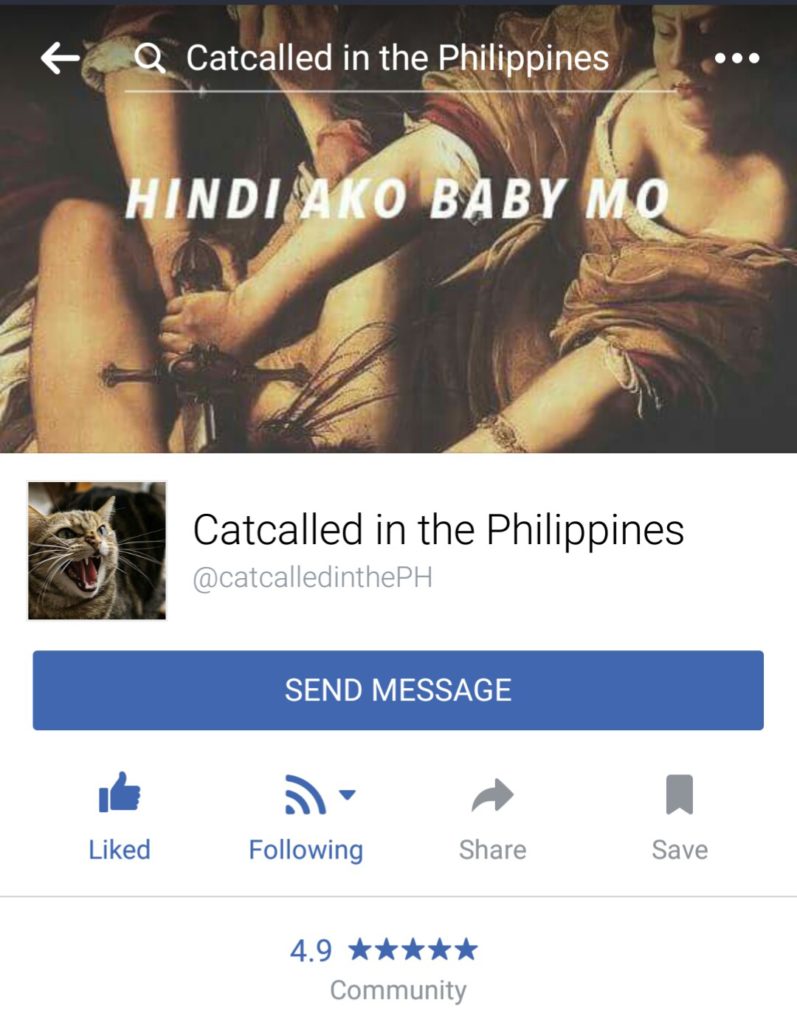Ken Rodrigo, Makati City, Philippines, SSH Blog Correspondent
 Women, girls and members of the LGBT+ in the Philippines continue to face the terrifying experience of being catcalled on the streets and other public spaces. This can make the experience, for both the locals and tourists, not fun! Fortunately, in the recent years, there is a growing recognition of the issue of gender-based harassment most apparent in catcalling. This can be attributed to a number of factors such as the rise of the LGBT+ movement and the availability of awareness promotion instruments such as the social media.
Women, girls and members of the LGBT+ in the Philippines continue to face the terrifying experience of being catcalled on the streets and other public spaces. This can make the experience, for both the locals and tourists, not fun! Fortunately, in the recent years, there is a growing recognition of the issue of gender-based harassment most apparent in catcalling. This can be attributed to a number of factors such as the rise of the LGBT+ movement and the availability of awareness promotion instruments such as the social media.
Platforms such as Facebook, blogs and interactive online news provide venue for discussion and exchange. In the Philippines, an ally of the Stop Street Harassment movement is a public Facebook page called ‘Catcalled in the Philippines’ founded in June 2016. In an interview I conducted with creator Raymond Peter Campiglio, he said he felt the need to provide a platform for people who suffer catcalling and other forms of abuse in public spaces. For him, there is a “lack of empathy and understanding regarding acts of personal violation.” It is also his intention to show that catcalling is not an isolated incident or happens because of the victim’s fault, but a social issue that is prevalent and must therefore be addressed.
Catcalled in the Philippines currently has nearly 16,000 likes and counting. It is a community where members are free to share their stories and learn from each other’s experiences. Apart from catcalling, issues such as sexual violence, the rape culture, and the various manifestations of misogyny in Philippine media and politics are also discussed.
Facebook: a double-edged sword
According to Raymond, the overall response to Catcalled in the Philippines is supportive, but he also stressed the challenges to his cause. He said: “I was surprised with the divided stance of a lot of people. Most of the supporters are female yet there are some female detractors as well. It showed me that internalized misogyny is more prevalent than I imagined. The overall response is support but a lot of the pushback are from people who feel that mobilization against it is a form of cultural disobedience.”
He also labelled Facebook as a double-edged sword, that while it is one of the widest and quickest ways to spread positive ideas, it does the same for negative ideas. For someone who simply wants to help address catcalling, he was shocked with his experience of being reported, causing the page to be paralyzed. He claims “the reporting system can be weaponized as a form of censorship and silencing.”
A message of hope
Asked to give a message to the public, Raymond said: “I want them to know that there will always be someone who is willing to help. Cliché as it sounds, they should never give up hope that the streets will be safer but patience will be needed. Apart from that, courage. Courage to stand up against it, even the courage to ask for help.”
Raymond explains that what he does is dedicated to his mother who as a single-parent raised him with values such as respect, passion and conviction to defend what he believes in, no matter the outcome.
Something bigger
Earlier this month, Raymond was invited by the Office of Senator Risa Hontiveros to participate in the press conference of the senator’s Safe Spaces Bill. The bill which aims to eliminate catcalling on a national scale is currently deliberated in the Senate. Additionally, a Catcalled in the Philippines website is a work in progress according to Raymond.
Ken is a teacher of international studies at a university in Manila. After law school, she traveled to Denmark and eventually studied in Malmö University in Sweden where she earned her master’s in Human Rights. You can contact her at krnrdrg@gmail.com or on Facebook.
